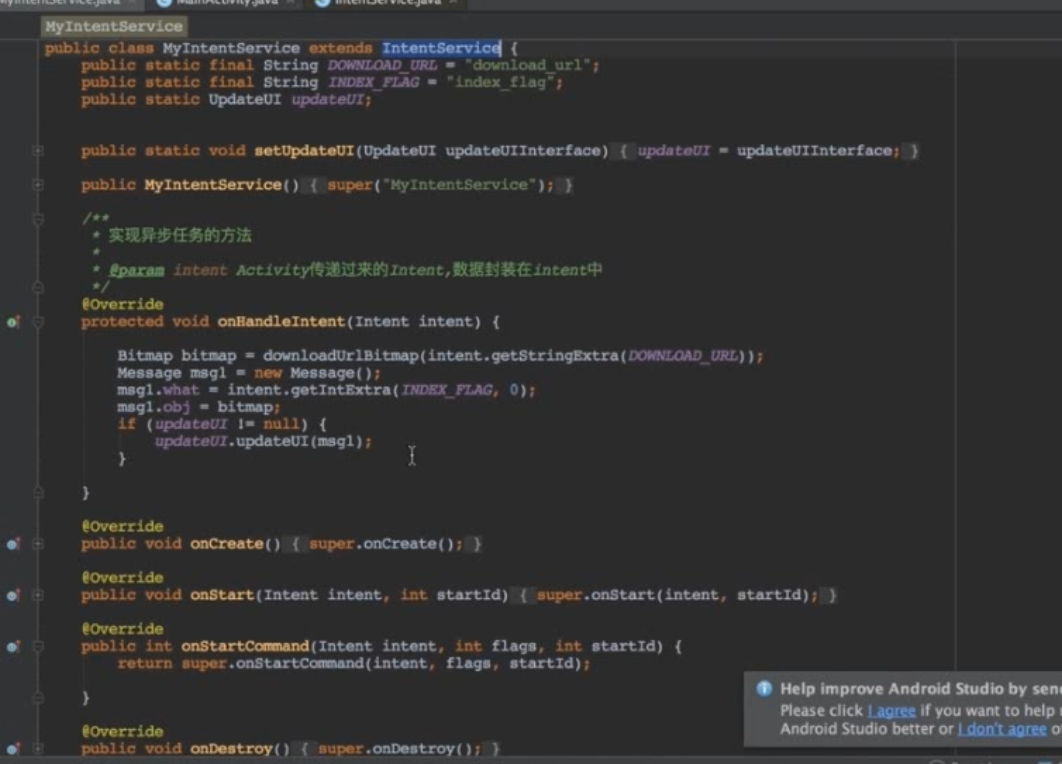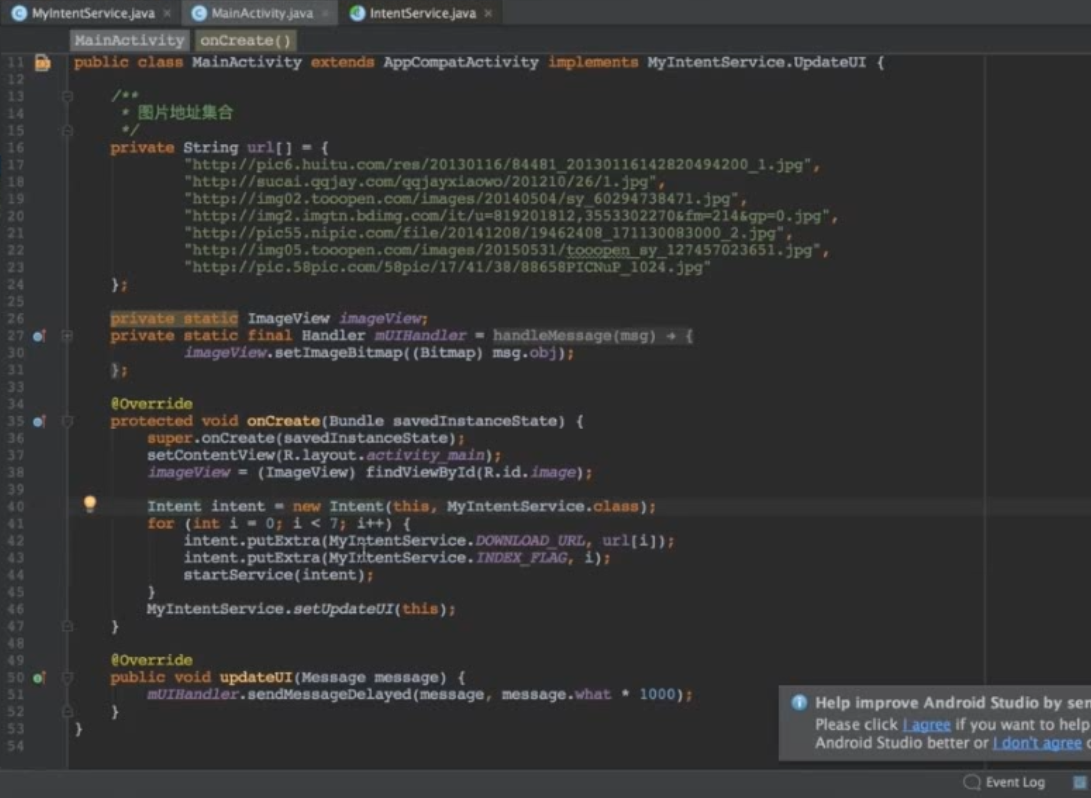IntentService是什么
IntentService是继承自Service并处理异步请求的一个类,但是优先级比Service高;
在IntentService内有一个工作线程来处理耗时操作(通过HandlerThread和Handler实现);
启动IntentService方式和传统Service一样;
区别在于执行完任务后,IntentService会自动停止,而不需要我们手动去控制或stopSelf();
另外,可以启动IntentService多次,而每一个耗时操作会以工作队列的方式在IntentService的onHandleIntent回调方法中执行,并且每次只会执行一个工作线程,执行完第一个再执行第二个;
IntentService 的使用方法

-
IntentService 是一个抽象类, 需要具体实现, 首先实现一个 MyIntentService;
-
必须实现两个方法, 一个是构造方法, 一个是 onHandleIntent 方法;
构造方法里传入一个字符串表示服务名称。
onHandleIntent里面可以做一些IntentService的耗时操作。

在onCreate方法里面虽然循环创建了7个IntentService实例,但是真正的实例只有一个。
IntentService 的源码解析
大致流程:
Service启动后首先执行的onCreate方法,在onCreate方法创建了HandlerThread,和ServiceHandler;
不了解HandlerThread可以看这篇文章
ServiceHandler继承自Handler,也就是说onCreate方法里面已经创建了 HandlerThread 和 Handler,
同时注意到用的是HandlerThread的Looper创建的Handler,也就是说Handler的looper和MessageQueue关联在子线程中。
然后Service按照生命周期执行到onStartCommand方法,这里添加了一个自定义的onStart方法,
onStart方法里去通过Handler发送消息,这个Handler就是ServiceHandler;
ServiceHandler 在它的 onHandleMessage方法里,执行onHandleIntent,从上面的介绍可知,onHandleIntent 是个抽象方法需要自己复写。
执行完 onHandleIntent 之后会调用 stopSelf 把服务关闭,也就是不用自己手动关闭。
这里stopSeft是带参数的,和不带参数的方法相比区别是:
带参数的不会立即执行,会等待所有消息处理完之后再终止服务。
不带参数会立即终止。
onHandleMessage 为什么是在子线程运行,也就是onHandleIntent为什么可以做耗时操作:
因为 ServiceHandler 的 looper 对应的是 HandlerThread 的 looper,
一般 Handler 创建在 Activity 中时,采用的是 MainLooper 绑定的是主线程,onHandleMessage 执行在主线程中。
同理 ServiceHandler 绑定的是 HandlerThread 的 looper,HandlerThread 本身就是子线程,
因此 ServiceHandler 的 onHandleMessage 方法运行在子线程,也就是说 onHandleIntent 方法中可以做耗时操作。
处理消息的顺序:
和Handler是一样的,这里的Looper是按照顺序从消息队列中取出任务的,也就是说 IntentServcie 的后台任务执行也是有顺序的。
当有多个后台任务时,这些后台任务也是会按照顺序执行的。
源码就下面几行。
public abstract class IntentService extends Service {
private volatile Looper mServiceLooper;
@UnsupportedAppUsage
private volatile ServiceHandler mServiceHandler;
private String mName;
private boolean mRedelivery;
private final class ServiceHandler extends Handler {
public ServiceHandler(Looper looper) {
super(looper);
}
@Override
public void handleMessage(Message msg) {
onHandleIntent((Intent)msg.obj);
stopSelf(msg.arg1);
}
}
/**
* Creates an IntentService. Invoked by your subclass's constructor.
*
* @param name Used to name the worker thread, important only for debugging.
*/
public IntentService(String name) {
super();
mName = name;
}
/**
* Sets intent redelivery preferences. Usually called from the constructor
* with your preferred semantics.
*
* <p>If enabled is true,
* {@link #onStartCommand(Intent, int, int)} will return
* {@link Service#START_REDELIVER_INTENT}, so if this process dies before
* {@link #onHandleIntent(Intent)} returns, the process will be restarted
* and the intent redelivered. If multiple Intents have been sent, only
* the most recent one is guaranteed to be redelivered.
*
* <p>If enabled is false (the default),
* {@link #onStartCommand(Intent, int, int)} will return
* {@link Service#START_NOT_STICKY}, and if the process dies, the Intent
* dies along with it.
*/
public void setIntentRedelivery(boolean enabled) {
mRedelivery = enabled;
}
@Override
public void onCreate() {
// TODO: It would be nice to have an option to hold a partial wakelock
// during processing, and to have a static startService(Context, Intent)
// method that would launch the service & hand off a wakelock.
super.onCreate();
HandlerThread thread = new HandlerThread("IntentService[" + mName + "]");
thread.start();
mServiceLooper = thread.getLooper();
mServiceHandler = new ServiceHandler(mServiceLooper);
}
@Override
public void onStart(@Nullable Intent intent, int startId) {
Message msg = mServiceHandler.obtainMessage();
msg.arg1 = startId;
msg.obj = intent;
mServiceHandler.sendMessage(msg);
}
/**
* You should not override this method for your IntentService. Instead,
* override {@link #onHandleIntent}, which the system calls when the IntentService
* receives a start request.
* @see android.app.Service#onStartCommand
*/
@Override
public int onStartCommand(@Nullable Intent intent, int flags, int startId) {
onStart(intent, startId);
return mRedelivery ? START_REDELIVER_INTENT : START_NOT_STICKY;
}
@Override
public void onDestroy() {
mServiceLooper.quit();
}
/**
* Unless you provide binding for your service, you don't need to implement this
* method, because the default implementation returns null.
* @see android.app.Service#onBind
*/
@Override
@Nullable
public IBinder onBind(Intent intent) {
return null;
}
/**
* This method is invoked on the worker thread with a request to process.
* Only one Intent is processed at a time, but the processing happens on a
* worker thread that runs independently from other application logic.
* So, if this code takes a long time, it will hold up other requests to
* the same IntentService, but it will not hold up anything else.
* When all requests have been handled, the IntentService stops itself,
* so you should not call {@link #stopSelf}.
*
* @param intent The value passed to {@link
* android.content.Context#startService(Intent)}.
* This may be null if the service is being restarted after
* its process has gone away; see
* {@link android.app.Service#onStartCommand}
* for details.
*/
@WorkerThread
protected abstract void onHandleIntent(@Nullable Intent intent);
}